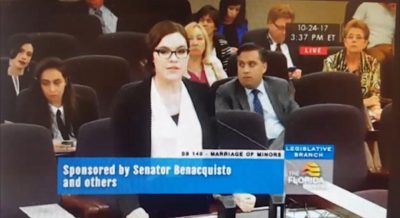FIU professor Sandy Skelaney and graduate student Allison Sardinas have been making the rounds in Tallahassee on a mission to end child marriage in Florida.

They recently met with 24 senators and representatives to gain support for Senate Bill 140 and House Bill 335, which would prevent anyone under 18 from getting a marriage license.
In Florida, children who are 16 or 17 years old are allowed to marry with the consent of both sets of parents. There is also no minimum age for marriage under the law if a girl is pregnant, as long as there is judicial approval. The proposed bills would close these loopholes once and for all, which are being exploited to marry children.
Of the 16,400 cases of early marriage reported in Florida in the last 15 years, 80 percent of them were minor girls marrying adult men. In some cases, the spouse was at least twice the minor’s age. These early marriages involve children who are not developmentally able to make decisions to consent or enter into lifelong contracts, said Skelaney.
“Psychologically, they are still developing the ability to process long-term consequences of decisions and have little life experience to draw from,” Skelaney said. “Parents should not have a right to enter children into a lifelong contract that will effectively allow an adult sexual access to a minor.”
Child marriage is legal in nearly every U.S. state and Florida has the second highest rate. According to Skelaney, the consequences of early marriage are devastating. The majority of girls end up halting education and slipping into a life of dependency and domestic abuse. They often experience a myriad of physical and mental health issues.
As part of the Florida Coalition to End Child Marriage, Skelaney and Sardinas made statements on the floor at the Senate Judiciary Committee meeting alongside Sherry Johnson, who at 11 years old was forced to marry her 20-year-old rapist.
The bill is currently working itself through the legislature.
“Florida is strong in the area of child protection,” Skelaney said. “We have been getting a lot of support from legislators, but we have a ways to go before the bills reach the floor to be voted on and signed by the governor to enter into law.”
Skelaney is program director of the Center for Women’s and Gender Studies Initiative for Gender Violence Prevention at FIU. Sardinas is the president of FIU’s Women’s Studies Graduate Student Association. Sardinas says the best way to support bills like these is by going to the Florida House and Senate websites to track their progress, then email and call the committee members asking to vote favorably for their respective bills during upcoming hearings.
“I hope people know that there are a million ways to get involved, and that even if you’re disenchanted with the system, or feel your voice won’t be heard, you can make a difference if you try hard enough,” Sardinas said. “This initiative in Florida started with tagging a legislator on Facebook. You never know what can happen.”





